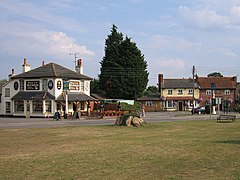Shinfield
| Shinfield | |
|---|---|
 The Bell and Bottle and The Royal Oak facing onto the village green |
|
| Shinfield shown within Berkshire | |
| Population | 8,136 (2001) 11,277 (2011 Census) |
| OS grid reference | SU7368 |
| Civil parish |
|
| Unitary authority | |
| Ceremonial county | |
| Region | |
| Country | England |
| Sovereign state | United Kingdom |
| Post town | Reading |
| Postcode district | RG7 |
| Dialling code | 0118 |
| Police | Thames Valley |
| Fire | Royal Berkshire |
| Ambulance | South Central |
| EU Parliament | South East England |
| UK Parliament | |
Shinfield is a village and civil parish in the English county of Berkshire, just south of Reading. It contains 4,313 acres (17.45 km2) and is administered by the unitary authority of Wokingham District.
The parish includes the roadside hamlets of Ryeish Green, Spencers Wood, Three Mile Cross, Shinfield Village and Grazeley and the southern suburb of Reading called Shinfield Rise. It is surrounded on its eastern and southern boundary by the River Loddon.
The M4 motorway runs west–east through the northern portion of the parish, near the county's old Shire Hall, now the offices of Foster Wheeler; the part to the north of the M4 corresponds closely with the part known as Shinfield Park. The main road through the village, running north–south, is the A327, running between Reading and Aldershot.
Shinfield Village is centred on the village green (School Green), surrounded by two pubs, a few shops, the village school and recreation grounds. Its residential housing has increased considerably in during the first years of the 21st century.
The parish consists of a central ridge of high land sloping down to the Loddon on the east and the Kennet Valley on the west. The soil is mostly London Clay, with patchy spreads of valley and plateau gravel.
As well as being part of the District of Wokingham, Shinfield is governed by a parish council consisting of fifteen parish councillors, assisted by two full-time administrative staff and several part-time caretaking and maintenance employees.
Shinfield has been part of the Hundred of Charlton since before the Norman Conquest. Hundreds effectively ceased to function after 1886. Between 1894 and 1974, it was in the Wokingham Rural District.
...
Wikipedia

